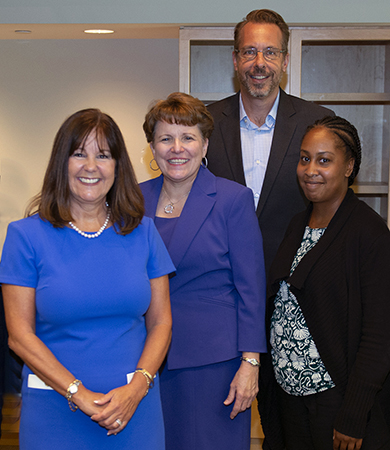
Military families face complex challenges, and while the Department of Defense brings considerable resources to bear to enhance the well-being of its fighting force and their families, there are sometimes challenges beyond the DoD’s control.
Nowhere has this been more evident than the career challenges faced by military spouses – made even more complex when considering a change of address every two to three years. Military spouses face a 23 percent unemployment rate, nearly six times the national rate.
For those spouses holding an occupational license, the barriers become even more daunting as Second Lady Karen Pence discussed with UMN faculty during a recent trip to campus. During numerous visits to military bases, Pence became convinced that this issue was something her office could elevate to better support military families.
Second Lady Pence had learned of the UMN research study, “Military Spouse Licensure Portability Examination,” and requested a meeting the team that had conducted it, Lynne Borden, Family Social Science professor, and her Center for Research and Outreach (REACH) at the University. The study was funded through a grant from the U.S. Department of Agriculture as part of the DoD/USDA Partnership for Military Families.
Borden’s research team has worked extensively with the Department of Defense to address key issues impacting military families and the programs that serve them. In this study, the DoD wanted to achieve two goals: review current state legislation on the portability of licenses and credentials for military spouses and interview six occupational boards in each state to assess how these best practices are implemented.
Borden brought two of her Lab’s key researchers, Mark Otto and Adeya Richmond, to discuss the issue with Pence and her team. Morris Kleiner, a professor and AFL-CIO Chair in Labor Policy at the Humphrey School of Public Affairs, provided a national perspective on how occupational licensing boards have replaced unions in their impact on wages and employment. He added that issues around the portability of licenses have had a significant negative impact on workers who want to move to where jobs are – whether it’s across the country or across state lines.
In their research, Borden and her team learned that all states (and the District of Columbia) have legislation or occupational board policies that support the portability of occupational licenses and credentials, and more than half of all states have included provisions specifically addressing the needs of military spouses.
Researchers also learned that despite the best intentions to follow legislation, communication breakdowns in both interpretation and implementation of legislation severely hampered efforts of military spouses seeking to transfer their licenses.
A common phrase in state legislation, “substantially equivalent” when describing education requirements required to transfer a license, was designed to empower state licensing board to determine requirements, but was also ambiguous enough that it led to a lack of clarity of what experience or information the military spouse had to possess. In addition, legislation using the words “will” versus “shall” also created “wiggle room” for state boards to interpret in implementing policy.
Borden said that policy makers and administrators were well-meaning, but that state boards’ websites were often complex and that communicating with them in a timely manner was difficult. Her REACH team had to reach out numerous times to each state’s licensing board to gather the information they needed for their study. Phone numbers weren’t published on websites or only allowed email communication. Responses were often slow and the team learned that using the “right word” in their queries was “everything.” All of these challenges impacts the individual’s ability to find the right answer to their questions.
She said some agencies had little experience with military spouses and that the time and multiple communications required, along with waiting up to a year to be approved, are significant barriers for a military spouse on a three-year assignment.
Pence called the licensure issue critical, and asked Borden and her team what her office could do to have an impact. They included:
· Digital solutions: an app for military spouses tailored to their specific profession or a central website that would help them navigate individual state legislation and state licensing boards.
· Advocate for training for state licensing boards to better understand and implement their state’s legislation.
· Increased financial support. While a current military program provides some financial support, increasing the amount could help military spouses move more quickly.
· Raise awareness among the state boards’ national governing or professional associations.
Pence and her team expressed gratitude to the University of Minnesota faculty and staff for their efforts on behalf of military families and that she hopes to discuss the issue further at an upcoming listening session at Fort Carson in September. She noted “spouses have a heavy load,” and that she wants to move ahead quickly to support military families.



